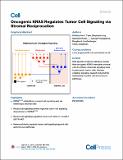Oncogenic KRAS Regulates Tumor Cell Signaling via Stromal Reciprocation
Author(s)
Ling, Stephanie; Dimitriadi, Maria; McMahon, Kelly M.; Worboys, Jonathan D.; Leong, Hui Sun; Norrie, Ida C.; Miller, Crispin J.; Poulogiannis, George; Jørgensen, Claus; Tape, Christopher; Lauffenburger, Douglas A; ... Show more Show less
DownloadOncogenic KRAS Regulates.pdf (3.541Mb)
PUBLISHER_CC
Publisher with Creative Commons License
Creative Commons Attribution
Terms of use
Metadata
Show full item recordAbstract
Oncogenic mutations regulate signaling within both tumor cells and adjacent stromal cells. Here, we show that oncogenic KRAS (KRAS[superscript G12D]) also regulates tumor cell signaling via stromal cells. By combining cell-specific proteome labeling with multivariate phosphoproteomics, we analyzed heterocellular KRAS[superscript G12D] signaling in pancreatic ductal adenocarcinoma (PDA) cells. Tumor cell KRAS[superscript G12D] engages heterotypic fibroblasts, which subsequently instigate reciprocal signaling in the tumor cells. Reciprocal signaling employs additional kinases and doubles the number of regulated signaling nodes from cell-autonomous KRAS[superscript G12D]. Consequently, reciprocal KRAS[superscript G12D] produces a tumor cell phosphoproteome and total proteome that is distinct from cell-autonomous KRAS[superscript G12D] alone. Reciprocal signaling regulates tumor cell proliferation and apoptosis and increases mitochondrial capacity via an IGF1R/AXL-AKT axis. These results demonstrate that oncogene signaling should be viewed as a heterocellular process and that our existing cell-autonomous perspective underrepresents the extent of oncogene signaling in cancer.
Date issued
2016-04Department
Massachusetts Institute of Technology. Department of Biological EngineeringJournal
Cell
Publisher
Elsevier
Citation
Tape, Christopher J. et al. “Oncogenic KRAS Regulates Tumor Cell Signaling via Stromal Reciprocation.” Cell 165.4 (2016): 910–920.
Version: Final published version
ISSN
0092-8674